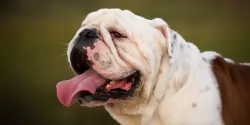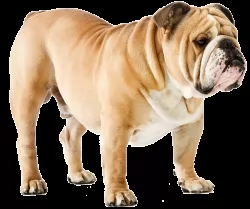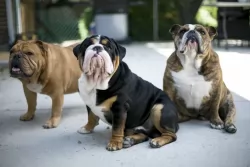 MyDogBreeds
MyDogBreeds Both Scottish Terrier and English Bulldog are originated from United Kingdom. Scottish Terrier may grow 14 cm / 5 inches shorter than English Bulldog. Scottish Terrier may weigh 15 kg / 33 pounds lesser than English Bulldog. Both Scottish Terrier and English Bulldog has almost same life span. Scottish Terrier may have more litter size than English Bulldog. Scottish Terrier requires Moderate maintenance. But English Bulldog requires Low maintenance
Both Scottish Terrier and English Bulldog are originated from United Kingdom. Scottish Terrier may grow 14 cm / 5 inches shorter than English Bulldog. Scottish Terrier may weigh 15 kg / 33 pounds lesser than English Bulldog. Both Scottish Terrier and English Bulldog has almost same life span. Scottish Terrier may have more litter size than English Bulldog. Scottish Terrier requires Moderate maintenance. But English Bulldog requires Low maintenance
 The Scottish Terrier is also known as the Aberdeen Terrier but people who love and know him refer to him fondly as the Scottie.
The Scottish Terrier is also known as the Aberdeen Terrier but people who love and know him refer to him fondly as the Scottie.
These little dogs were originally bred to hunt vermin on farms and their actual origin is ancient. It is believed that the first descriptions of these dogs date way back to 1436 with there being 2 varieties - a rough-haired Scotch Terrier and a smooth-haired English Terrier.
In 1881 the Scottish Terrier Club of England was founded with the Scottish Terrier Club of Scotland being founded in 1888. Scotties were introduced to America in the early 1890s.
 At earlier time English Bulldogs were not as it was now. They were taller and was fierce in their nature. They were completely developed in England.The first breed was set in at about 1500. After that they were involved in a game called Bull baiting in England, where a fight was set in between a Bull and the Bulldog.
At earlier time English Bulldogs were not as it was now. They were taller and was fierce in their nature. They were completely developed in England.The first breed was set in at about 1500. After that they were involved in a game called Bull baiting in England, where a fight was set in between a Bull and the Bulldog.
English Bulldogs will be on full fierce by biting and holding the bull even when they jump or struggle, until they fall on the ground. After that Bull baiting was banned in England, and everyone thought Bulldog will disappear. But some breeders re engineered it and made it as it was now. In 1950s Bulldogs ranked among top 10 in America.
 The Scottish Terrier is a small dog, fairly robustly built but with short legs. He has a wiry, weather-resistant coat and a soft undercoat. The coat is essentially black but there are other colors too such as a wheaten shade, grey-black and brindle too.
The Scottish Terrier is a small dog, fairly robustly built but with short legs. He has a wiry, weather-resistant coat and a soft undercoat. The coat is essentially black but there are other colors too such as a wheaten shade, grey-black and brindle too.
The ears are erect, the eyes small and bright. The tail isn’t docked but is of medium length and is nearly always held up, without curling over the back.
Height at withers for both males and females should be roughly 23 to 26cm and weight in the region of 8 – 10 kg.
The Scottie is a an independent, robust breed. He is playful as a puppy, but as he matures he becomes more dignified and dour. He is stubborn, but being a terrier he is alert and makes a good watchdog. For a small dog he has a powerful bark.
Brave, loving and loyal, he can fit into life in the city or the countryside so long has he has his human family close by. He doesn’t take kindly to strangers and he he slightly aggressive with other dogs he doesn’t know. He makes a great playmate for children but he certainly doesn’t like being prodded, sat on and poked by small children.
 English Bulldogs are muscular in nature. They easily gain over weight and so exercising them is very mandatory. They are well suitable for apartment living, since they will always like to lie down and sleep. They will woke up only for their food. But they are very much faithful for their owners and it will be seen very loving when they come near and look at you.
English Bulldogs are muscular in nature. They easily gain over weight and so exercising them is very mandatory. They are well suitable for apartment living, since they will always like to lie down and sleep. They will woke up only for their food. But they are very much faithful for their owners and it will be seen very loving when they come near and look at you.
Since they face respiratory problems they should not be compelled to play for very long time. Their look may be ferocious but they are very calm and loving towards others unless you do any harm to them or their owners.
 The Scottie is strong willed and independent, and training and socialization is important if you don’t want your Scottie believing he has the final say.
The Scottie is strong willed and independent, and training and socialization is important if you don’t want your Scottie believing he has the final say.
These dogs are stubborn and dominant and will need a strong, firm but kind owner. They’re aggressive with other dogs, but get on well with their human family.
When you bring one of these distinctive looking dogs into your home, he’ll be a loving, loyal friend.
 They are good companion for children, but it is recommended to have an adult supervision and not allowing them alone.
They are good companion for children, but it is recommended to have an adult supervision and not allowing them alone.
They are the best companion dogs. They take decisions after thinking for a while. They are very faithful for their owners, and if anybody does harm to their owners infront of them, then they will show their full energy and teach a lesson to them.
They adapt well for apartment living. They can be leaved alone in home for some hours but they love to stay with anyone in the house. English Bulldog love to live in moderate weather, both hot and cold weather will bring problems to them.
Bulldog will not do all things you order them, as they think well and take their decision well. They think what will they get by doing what you say, and then only they will do it.
 Your Scottie is looked upon as being a generally healthy dog breed, but as with any other healthy dogs, he can succumb to some of the conditions and diseases that dogs get -
Your Scottie is looked upon as being a generally healthy dog breed, but as with any other healthy dogs, he can succumb to some of the conditions and diseases that dogs get -
This is an inherited blood disorder where the blood doesn’t clot properly. The dog will bleed excessively after an injury. Fortunately, while there isn’t a cure, dogs can lead normal lives.
Scottish Terriers are more prone to developing cancer than other dogs. Bladder cancer, lymphosarcoma and malignant melanoma are just some of the cancers they can get. Some cancers are treatable and there is a good success rate in dogs receiving chemotherapy.
When you brush your Scottie, look out for new, unusual lumps that could be indicative of cancer.
Scotty Cramp isn’t serious but uncomfortable for your pet. When your dog becomes worked up, you’ll see him arching his spine and he walks around for a few minutes with a stiff unnatural gait.
Obesity is regarded as a serious disease as it puts strain on the dogs joints and also creates back pain and digestive disorders.
 They have chances of getting problems due to brachycephalic syndrome, this is because of their short face. Also they suffer from respiratory problems. Bone and joint problems are also common in them.
They have chances of getting problems due to brachycephalic syndrome, this is because of their short face. Also they suffer from respiratory problems. Bone and joint problems are also common in them.
English Bulldog has chances of getting skin problems and hair fall is the initial for those skin problems. Normally they shed hair upto a considerable level.
 Scotties were once bred as working dogs, and they will certainly require daily exercise and stimulation. He will love a walk but you can’t expect him to run with you as he has short legs.
Scotties were once bred as working dogs, and they will certainly require daily exercise and stimulation. He will love a walk but you can’t expect him to run with you as he has short legs.
The Scottie sheds, so he will need to be brushed at least twice weekly. He will require quite a bit of grooming in terms of having the coat professionally trimmed and clipped.
His eyes and ears will need to be checked as well as his teeth. He can’t tell you if he has terrible toothache and while brushing him, check the teeth. Trim his nails too.
It is always recommended that you feed dogs according to size, age and activity levels. Dogs are individuals and they don’t all need the same food.
The quality of the dog food you provide makes a huge difference on your dog’s health. It always pays to go with the better quality kibble available to dogs. Your Scottish Terrier will be depending on your for quality kibble with the right blend of vitamins and minerals.
Dogs thrive on simplicity and consistency and you want to provide him with some home-made food too that gels well with his digestive system. A little bit of raw meat occasionally can also do him the world of good.
Make sure he always has cool, fresh water to drink.
 English Bulldog puppy needs more energy and nutrients for its growth, so they must be fed several times a day but the amount should be less. They should not be given raw meat and foods that may be gone bad. The food given to puppy should be allowed to eat for only 20 minutes. After that time if balance food remains in bowl they should be removed and for the next meal new food should be given.
English Bulldog puppy needs more energy and nutrients for its growth, so they must be fed several times a day but the amount should be less. They should not be given raw meat and foods that may be gone bad. The food given to puppy should be allowed to eat for only 20 minutes. After that time if balance food remains in bowl they should be removed and for the next meal new food should be given.
The puppy shall be given cooked food which we eat and it is preferable to give cooked meat and bones three times a week. Salt should be added less for them and sugar should not be given.
The bulldog can be fed 1 to 2 times per day, that is morning and evening. It is not recommended to give them soybean oil, chocolates and onions. Kibbles can also be given to them.
Nutritional food is the main factor for their health and the vaccinations should be made at the right time with consulting the veterinarian.
English Bulldogs may have less energy, but they love to play. They can be made to chase after a ball or Frisbee. But short chasing will be good for them. They should not be made to play in hot sun as they suffer with some heat problems. Also they are interested in playing Tug of war, Hide and seek and solving puzzles.